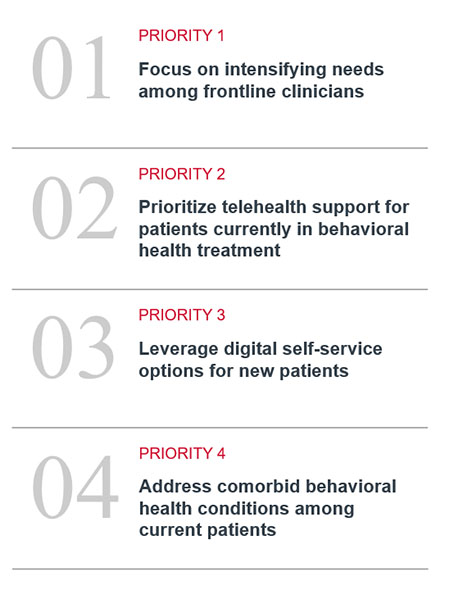Auto logout in seconds.
Continue LogoutSome Americans may feel like they're "craving" contact with others as they continue social distancing amid the country's new coronavirus epidemic, and a study recently published in Nature Neuroscience suggests they may be right.
Ready-to-use slides: The latest neurosciences market trends
Study details
For the study, researchers at the Massachusetts Institute of Technology (MIT) conducted two separate observations among a group of 40 healthy and socially connected adults ages 18 to 40. Most of the participants were college students.
The first observation involved participants going 10 hours without any social contact, and the second observation involved participants going 10 hours without food.
During the first observation, researchers confined the participants to windowless rooms on MIT's campus. Rebecca Saxe, the study's senior author and a professor of brain and cognitive sciences at MIT, said the researchers used several interventions to ensure the participants felt isolated during the 10-hour observation period.
For example, the researchers prohibited participants from using phones, and Saxe said the participants "had to let [researchers] know when they were going to the bathroom so [the researchers] could make sure it was empty." The participants also had food delivered to their doors, and they received messages when their food arrived, according to Saxe. In short, the participants "really were not allowed to see people," Saxe said.
To keep themselves busy during the two observation periods, the participants could solve puzzles, play simple computer games, or read written texts approved by researchers, Medical News Today reports. The participants periodically filled out questionnaires rating how they felt about isolation and their levels of discomfort, happiness, loneliness, and social craving.
During the second observation period, participants were permitted to have social interactions with others, but they could not have food.
At the end of both observations, participants underwent MRI scans as they viewed images of their favorite social activities, favorite foods, and flowers, which the researchers said served as a control image. The participants underwent the same MRI scans on baseline days without fasting or social isolation.
'Craving' social contact is the same as craving food
Overall, the researchers found that social isolation activated the same area of the brain as hunger.
Specifically, the researchers that found the small region in the middle of the brain called the substantia nigra became more active when socially isolated participants viewed images of their favorite social activities, as well as when fasting participants viewed images of their favorite foods. The researchers also found that the amount of activity in each participant's substantia nigra correlated with the intensity of food or social interaction cravings they reported.
Ultimately, Saxe said the results showed that "[p]eople who are forced to be isolated crave social interactions similar to the way a hungry person craves food."
In addition, the researchers said participants reported lower cravings for social interactions if they had also reported feeling chronically isolated before joining the study. But in contrast, Saxe said, "For people who reported that their lives were really full of satisfying social interactions, this intervention had a bigger effect on their brains and on their self-reports."
Although hunger and social isolation triggered a similar response in the substantia nigra, the researchers found that the two conditions caused distinct patterns of activation in other parts of the brain, including the striatum and cortex. "That suggests that those areas are more specialized to respond to different types of longings, while the substantia nigra produces a more general signal representing a variety of cravings," the researchers wrote.
The researchers said they are planning to conduct further studies to determine how social isolation affects different age groups, how isolation impacts behaviors, and whether video calls help address feelings of loneliness (Trafton, MIT News, 11/23; Dunn, Fortune, 11/24; Kingsland, Medical News Today, 11/29; Tomova et al., Nature Neuroscience, 11/23).

The psychological impact of the Covid-19 pandemic is unprecedented—fear, isolation, distrust. This is rapidly increasing the need for behavioral health services. But there are significant gaps and barriers that stand in the way of people getting the help they need.
Health systems should prioritize addressing the immediate needs of both staff and patients, especially those with preexisting behavioral health needs or comorbid conditions. Read on for our full take.
Don't miss out on the latest Advisory Board insights
Create your free account to access 1 resource, including the latest research and webinars.
Want access without creating an account?
You have 1 free members-only resource remaining this month.
1 free members-only resources remaining
1 free members-only resources remaining
You've reached your limit of free insights
Become a member to access all of Advisory Board's resources, events, and experts
Never miss out on the latest innovative health care content tailored to you.
Benefits include:
You've reached your limit of free insights
Become a member to access all of Advisory Board's resources, events, and experts
Never miss out on the latest innovative health care content tailored to you.
Benefits include:
This content is available through your Curated Research partnership with Advisory Board. Click on ‘view this resource’ to read the full piece
Email ask@advisory.com to learn more
Click on ‘Become a Member’ to learn about the benefits of a Full-Access partnership with Advisory Board
Never miss out on the latest innovative health care content tailored to you.
Benefits Include:
This is for members only. Learn more.
Click on ‘Become a Member’ to learn about the benefits of a Full-Access partnership with Advisory Board
Never miss out on the latest innovative health care content tailored to you.
